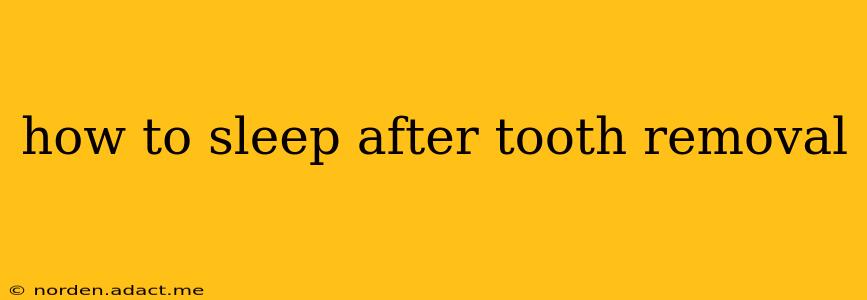Having a tooth extracted can be a disruptive experience, impacting not just your oral health but also your sleep. Post-operative discomfort, swelling, and bleeding can make finding a comfortable sleeping position challenging. This comprehensive guide offers advice on how to optimize your sleep after tooth extraction, ensuring a smoother recovery.
What to Expect After Tooth Extraction: Sleep Disruptions
The first night after tooth extraction is often the most challenging. You might experience pain, swelling, and bleeding, making it difficult to find a comfortable position. This is perfectly normal. However, adequate rest is crucial for healing. The body repairs itself most effectively during sleep.
How to Sleep Comfortably After Tooth Extraction
Here's a step-by-step guide to improve your sleep quality post-extraction:
1. Elevate Your Head: The Key to Reducing Swelling
Elevating your head is paramount. Propping yourself up with extra pillows helps reduce swelling and minimizes bleeding. Aim for a 45-degree angle. This allows gravity to assist in reducing inflammation and preventing blood from pooling in the extraction site.
2. Ice Packs: Your Best Friend for Pain and Swelling
Apply ice packs to your cheek, near the extraction site, for 15-20 minutes at a time, several times throughout the day and night. This helps to numb the area, reduce pain, and control swelling. Always wrap the ice pack in a thin towel to avoid direct contact with your skin.
3. Pain Management: Medication and Comfort
Follow your dentist's instructions regarding pain medication. Take medication as prescribed to manage pain levels and ensure you can relax enough to sleep. Do not exceed the recommended dosage.
4. Choosing the Right Sleeping Position: Side Sleeping vs. Back Sleeping
Sleeping on your back is generally recommended after tooth extraction, as it minimizes pressure on the extraction site. However, if you're a side sleeper, gently sleep on the opposite side of the extraction. Avoid pressing directly on the area. Using extra pillows for support can help maintain this position throughout the night.
5. Oral Hygiene: Gentle Cleaning
While you should avoid vigorous rinsing, gently cleaning the rest of your mouth is important. Brush your teeth carefully, avoiding the extraction site. Use a soft-bristled brush and gentle strokes.
Frequently Asked Questions (FAQs)
How long does it take to recover from tooth extraction?
Recovery time varies depending on the complexity of the extraction. Simple extractions may heal within a week, while more complex extractions might require several weeks. Pain and swelling should subside gradually.
What if I can't sleep after tooth extraction due to pain?
If pain prevents you from sleeping, contact your dentist or oral surgeon immediately. They can adjust your pain medication or offer other strategies to help manage discomfort. Never hesitate to reach out for professional guidance.
Can I use a heating pad after tooth extraction?
No, avoid using a heating pad during the initial recovery phase (at least the first 24-48 hours). Heat can increase swelling and bleeding. Ice is preferred during this period. Heat may be considered after a few days to help reduce discomfort, but always consult your dentist first.
Is it okay to sleep on my stomach after a tooth extraction?
No, sleeping on your stomach is generally not recommended after a tooth extraction. This can put pressure on the extraction site and increase the risk of bleeding or infection.
Should I sleep with my mouth open or closed after a tooth extraction?
Sleeping with your mouth closed is preferable. This helps maintain a clean and dry environment within the mouth and assists with healing. Breathing through your nose is best.
Conclusion: Prioritizing Rest for Optimal Healing
Getting enough sleep after a tooth extraction is essential for your recovery. By following these recommendations, you can minimize discomfort, reduce swelling, and promote healing, leading to a more restful and successful recovery. Remember to always consult your dentist or oral surgeon if you have any concerns or experience unexpected complications. Prioritizing rest allows your body to focus on the healing process, leading to a faster and more comfortable recovery.
